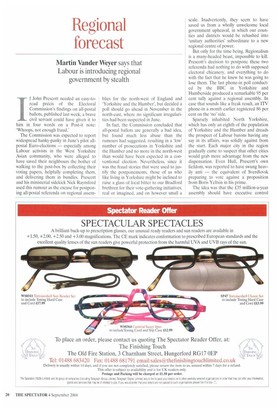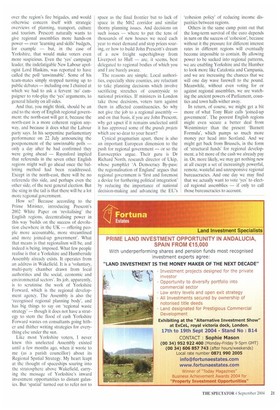Regional forecast
Martin Vander Weyer says that Labour is introducing regional government by stealth 1 f John Prescott needed an easy-toread précis of the Electoral Commission's findings on all-postal ballots, published last week, a brave civil servant could have given it to him in four words on a Post-it note: 'Whoops, not enough fraud.'
The Commission was expected to report widespread hanky-panky in June's pilot allpostal Euro-elections — especially among Labour activists in the West Yorkshire Asian community, who were alleged to have saved their neighbours the bother of walking to the post-box by collecting their voting papers, helpfully completing them, and delivering them in bundles. Prescott and his ministerial sidekick Nick Raynsford used this rumour as the excuse for postponing all-postal referenda on regional assem
blies for the north-west of England and 'Yorkshire and the Humber', but decided a poll should go ahead in November in the north-east, where no significant irregularities had been suspected in June.
In fact, the Commission concluded that all-postal ballots are generally a bad idea, but found much less abuse than the rumours had suggested, resulting in a low' number of prosecutions in Yorkshire and the Humber and no more in the north-west than would have been expected in a conventional election. Nevertheless, since it was the fraud stories that were used to justify the postponements, those of us who like living in Yorkshire might be inclined to raise a glass of local bitter to our Bradford brethren for their vote-gathering initiatives, real or imagined, and on however small a scale. Inadvertently, they seem to have saved us from a wholly unwelcome local government upheaval, in which our counties and districts would be rehashed into 'unitary authorities' subordinate to a new regional centre of power.
But only for the time being. Regionalism is a many-headed beast, impossible to kill. Prescott's decision to postpone these two referenda had nothing to do with supposed electoral chicanery, and everything to do with the fact that he knew he was going to lose them. The last phone-in poll conducted by the BBC in Yorkshire and Humberside produced a remarkable 95 per cent tally against a regional assembly. In case that sounds like a freak result, an ITV phone-in a month earlier registered 86 per cent on the 'no' side.
Sparsely inhabited North Yorkshire, which has only an eighth of the population of Yorkshire and the Humber and dreads the prospect of Labour barons having any say in its affairs, was solidly against from the start. Each major city in the region gradually came to suspect that other cities would grab more advantage from the new dispensation. Even Hull, Prescott's own fiefdom, was reported to have swung heavily anti — the equivalent of Sverdlovsk preparing to vote against a proposition from Boris Yeltsin in his prime.
The idea was that the £35 million-a-year assembly should have executive control over the region's fire brigades, and would otherwise concern itself with strategic overviews of planning, transport, culture and tourism. Prescott naturally wants to give regional assemblies more hands-on power — over learning and skills' budgets, for example — but, in the case of Yorkshire, that would make voters even more suspicious. Even the 'yes campaign leader, the indefatigable New Labour apologist Lord Haskins, was reported to have called the poll 'unwinnable'. Some of his team-mates simply stopped turning up to public debates — including one I chaired at which we had to ask a fervent 'no' campaigner to role-play the 'yes' arguments, to general hilarity on all sides.
And that, you might think, should be an end to the story of English regional government: the north-east will get it, because the north-east is a more coherent region anyway, and because it does what the Labour party says. In his serpentine parliamentary performance on 22 July announcing the postponement of the unwinnable polls — only a day after he had confirmed they were going ahead — Raynsforci implied that referenda in the seven other English regions might well go ahead once the balloting method had been readdressed. Except in the north-east, there will be no referenda this side, and perhaps even the other side, of the next general election. But the sting in the tail is that there will be a lot more regional government.
How so? Because according to the Prime Minister. introducing Prescott's 2002 White Paper on 'revitalisingthe English regions, decentralising power in this way 'builds on the success of devolution elsewhere in the UK — offering people more accountable, more streamlined and more joined-up government'. What that means is that regionalism will be, and indeed is being, imposed. What few people realise is that a Yorkshire and Humberside Assembly already exists. It operates from an address in Wakefield. It is a 'voluntary, multi-party chamber drawn from local authorities and the social, economic and environmental sectors'. Its job, apparently, is to scrutinise the work of Yorkshire Forward, which is the regional development agency. The Assembly is also the 'recognised regional planning body', and has big things to say on 'regional waste strategy' — though it does not have a strategy to stem the flood of cash Yorkshire Forward wastes on consultants going hither and thither writing strategies for everything else under the sun.
Like most Yorkshire voters, I never knew this unelected Assembly existed until a few months ago. when it wrote to me (as a parish councillor) about its Regional Spatial Strategy. My heart leapt at the thought of spaceships soaring into the stratosphere above Wakefield, carrying the message of Yorkshire's inward investment opportunities to distant galaxies. But 'spatial' turned out to refer not to space as the final frontier but to lack of space in the M62 corridor and similar thorny planning issues. And decisions on such issues — where to put the tens of thousands of new houses we need each year to meet demand and stop prices soaring, or how to build John Prescott's dream of a new freight superhighway from Liverpool to Hull — are, it seems, best delegated to regional bodies of which you and I are barely aware.
The reasons are simple. Local authorities, especially shire counties, are reluctant to take planning decisions which involve sacrificing stretches of countryside to national priorities. If ministers in London take those decisions, voters turn against them in affected constituencies. So why not give the job to a regional assembly — and on that basis, if you are John Prescott, why get upset if it remains unelected until it has approved some of the grands projets which are so dear to your heart?
Cynical pragmatism apart, there is also an important European dimension to the push for regional government — or so the Eurosceptics argue. Their guru is Dr Richard North, research director of Ukip, whose pamphlet 'A Democracy By-pass: the regionalisation of England' argues that regional government is 'first and foremost a device for furthering political integration' by reducing the importance of national decision-making and advancing the EU's 'cohesion policy' of reducing income disparities between regions.
Others in the same camp point out that the long-term survival of the euro depends in turn on the success of 'cohesion', because without it the pressure for different interest rates in different regions will eventually become impossible to contain. By allowing power to be sucked into regional patterns, we are enabling Yorkshire and the Humber to look more like Catalonia and Campania, and we are increasing the chances that we will one day wave farewell to the pound. Meanwhile, without even voting for or against regional assemblies, we are watching the ancient powers of Parliament, counties and town halls wither away.
In return, of course, we might get a bit more of what Tony Blair calls `joined-up government'. The poorest English regions might even secure a better deal from Westminster than the present 'Barnett Formula', which pumps so much more money per head into Scotland. And we might get back from Brussels, in the form of 'structural funds' for regional development, a bit more of the cash we already pay in. Or, more likely, we may get nothing new at all except a set of increasingly powerful, remote, wasteful and unresponsive regional bureaucracies. And one day we may find that we actually want to vote 'yes' to elected regional assemblies — if only to call those bureaucracies to account.



































































 Previous page
Previous page